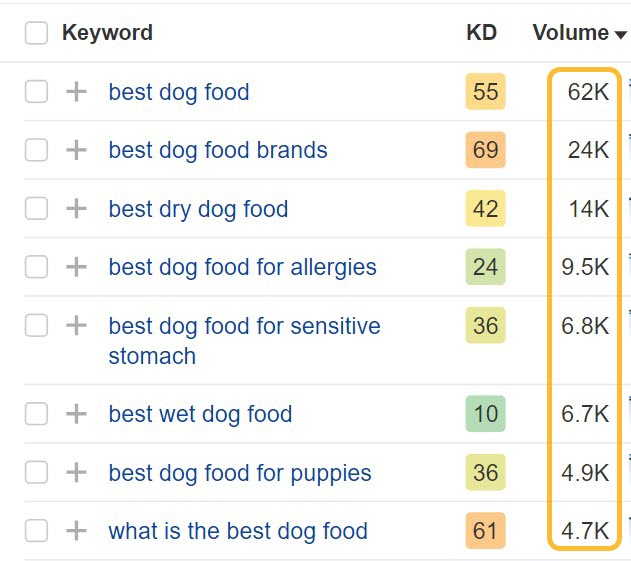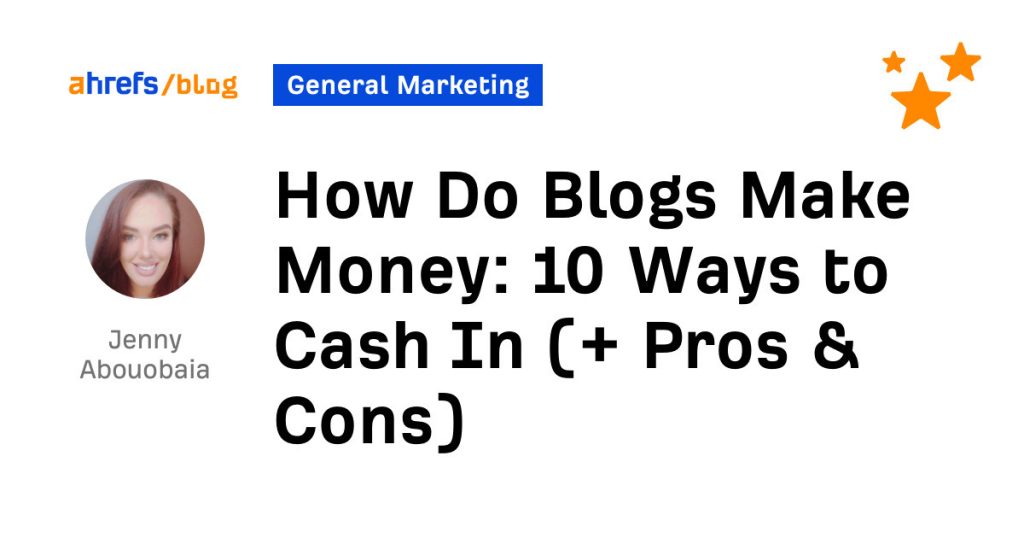[ad_1]
Every other day, a new blogger claims they are earning a full-time income from their blog. But how exactly do they do it?
In this article, we will discuss 10 popular methods bloggers use to cash in on their passion, along with the pros and cons of each approach.
Although many people claim to earn a full-time income, studies show only around 5%-8% of bloggers actually do.
The monetization strategies you use and how successful you are at implementing them play a huge role in how much you can earn from blogging. If you don’t know the different methods to use, you’re not going to cash in.
I personally know content site owners earning six figures from their blogs, while some can earn even more.
In fact, globally known blogger Pete Cashmore (made Forbes’ 2014 30 under 30 list) has an estimated net worth of over $120 million. This is largely thanks to his website, Mashable, which he started in 2005 and sold in 2017 for $50 million.
Some of the most profitable blogs make money through affiliate marketing, sponsored posts, advertisements, product sales, services, and more.
Each method requires careful planning and implementation to maximize your earning potential.
Additionally, it’s important to remember that success takes time; you’re not likely to see immediate results when launching a blog, even with the best monetizing strategies. It takes dedication and hard work before you start to reap financial rewards.
Now let’s dive into the 10 most popular ways blogs make money:
Advertising
Companies have always been willing to pay for advertising space. In the past, ads could be regularly seen on newspapers, magazines, and billboards. Today, it’s common to see display or banner ads on websites, which often rely on them as a source of income.
You can negotiate directly with a company or brand on a price you want and handle everything yourself. Or you can try an ad network like Google AdSense, Raptive, or Ezoic for a hands-off approach.
Either way, it works by placing ads on your website that are relevant to your content and niche.
When visitors click on the ad, you will earn a commission from the advertiser.

How much can you earn?
Typically, you earn between $0.01 and $0.25 per pageview. Of course, this depends on your niche and the ad network you work with.
Pros
Ads are relatively easy to set up and manage. Especially with some of the bigger platforms like Mediavine, you can have someone who manages everything for you. Plus, there’s huge potential to earn money passively over time.
Cons
Firstly, ads can be intrusive and detract from user experience. We’ve all seen sites with badly optimized ads where you can’t read one line of text because the page is plastered with ads.
Secondly, it’s difficult for people who are just getting started to earn a good income passively solely with ads. Remember that many ad networks, like Mediavine, have a minimum requirement to join, such as 50,000 monthly sessions.
Those that allow you to join without a minimum requirement, like Ezoic, require you to complete courses and set up and manage your own ads if your site gets fewer than 10,000 monthly visits.
Unless you’re comfortable managing ads, you’re likely not going to get the most out of them without assistance from the advertising network.
Affiliate marketing
Affiliate marketing is a popular way for bloggers to monetize their websites. With affiliate programs, you can earn commissions when readers purchase products or services through affiliate links on your website.
Creating a niche site that uses affiliate marketing as the main form of monetization is one of the quickest ways to earn a full-time income online. From personal experience, you can earn four figures a month within 12 months with a high-quality affiliate marketing site.
The truth is people love review content. For example, imagine you just got your first puppy. A super easy way to get what you need and feel confident as a new dog owner is to read in-depth reviews from other experienced dog owners.
Continuing with that example, a single page on the best dog food for 2023 can generate over thousands of monthly organic visits, ranking for hundreds of keywords.
You can understand the demand for this type of blog when you look at the search volume of some keywords in the U.S. alone:

Plus, the entire first page on Google for “dog food” shows commercial search intent, with numerous reviews also showing up.

You can work with affiliate networks like Amazon Associates and Commission Junction or through private affiliate programs.
How much can you earn?
On average, affiliate networks offer lower commissions (between 1% and 10%), whereas private affiliate programs offer anything up to 90% affiliate commissions.
Therefore, if you’re producing dozens of articles per month reviewing high-ticket items with an affiliate program that offers a 60% affiliate commission, you can earn a comfortable income.
Pros
Affiliate marketing is easy to start, doesn’t require you to create and manage products or services, and can potentially bring in large commissions.
Cons
It requires a lot of work in the beginning (creating content, building relationships with affiliates, and so on) and can be difficult to scale over time if you don’t choose the right niche or have the right team in place.
Sponsored content
Social proof is one of the best ways to get people interested in your products. That’s why companies pay bloggers to write sponsored posts or create sponsored content in exchange for a fee.

How much can you earn?
That will heavily depend on how much traffic your website gets, as well as how influential you are. But the average is anywhere between $25-$1,000 per post.
Pros
This can be a great way to get paid for your content, with the potential to earn a large amount of money per post. It can also help you to build lasting relationships with brands.
Cons
It can be difficult to find sponsors, especially if you are not considered an “influencer” in your niche. It also requires lots of work (research, writing, promotion), and you must be careful to remain unbiased.
Selling services
By producing content on a particular topic and gaining a sustainable readership, people will naturally associate your name with your topic of expertise. That way, you become an authoritative voice in your niche.
Because of this, bloggers can use their websites to market and sell services such as consulting, coaching, digital marketing services, and so on.

How much can you earn?
It depends on the service you’re selling. But as an example, consulting gigs can earn anything between $60–$300 per hour.
Pros
It’s easy to start with (assuming you have an existing reputation) and needs very little upfront cost or work to get going. Plus, there is potential for high earnings from services that can also build long-term relationships with clients.
Cons
If you want to actually deliver a quality service, you need to put all your efforts into it, which may be difficult to maintain if you’re already running a blog full-time. If you can’t, you will be offering a subpar service, which won’t have clients returning for more.
It’s also difficult to scale over time, as clients want to work with you, the expert, not an employee.
Selling physical and digital products
Many bloggers create and sell physical or digital products on their websites, such as ebooks, courses, merchandise, etc.
Digital products are more scalable and don’t take as much work to put together. For example, with ebooks, you write the book one time, and then can sell thousands of copies year after year.

How much can you earn?
Again, this depends on the products you’re selling. But it can be anything from $4 for a book to $50 for merchandise items like T-shirts.
Pros
There is huge potential for high passive earnings from sales of the products, and it is easy to scale.
Cons
Selling products requires a significant upfront investment in terms of creating the products. Even ebooks take significant time to write and edit, produce artwork, and so on.
With physical products, there is the additional work of setting up the management of product sales to ensure products are manufactured and shipped without any problems.
Online courses
Online courses are a great way for bloggers to monetize their websites.
As a topic expert, you can create an online course related to your niche and sell it on your website.
There are even instances of people with successful personal blogs selling courses on “blogging tips” or “how to make money from affiliate marketing.”

How much can you earn?
On average, courses sell between $400 and $1,000 per sale. But of course, it depends on the niche and how much of a following you have.
Pros
There is a potential for high earnings from sales of a course, and it’s easy to scale with additional courses.
Cons
Courses require a significant time investment (creating the course content), require marketing efforts to find customers, and can be difficult to compete against larger businesses with more resources.
Coaching and mentoring
Bloggers can easily pick up a cult following of aspiring bloggers who want to be just like them. With expertise in your niche, you can offer one-on-one coaching or mentoring services to help others learn.
As someone who has mentored many times, I can say from experience that it can be rewarding.

How much can you earn?
That depends on how well-established you are, but you can earn $50–$150 per hour on average.
Pros
Not only can you earn a solid income from coaching, but it can also be extremely rewarding to see former mentees build and develop their own successful careers.
Cons
It requires a lot of work to deliver the service and build and maintain relationships, and you must be careful to remain unbiased and ethical when providing advice.
Public speaking
Bloggers with expertise in their niche can share their knowledge and experiences through public speaking engagements. This can be at industry workshops, seminars, and conferences.

How much can you earn?
You can earn anything from $500–$10,000 per event, depending on how high-profile you are.
Pros
There is potential for high earnings from speaking fees, and it is easy to scale with additional engagements. Plus, it requires minimal upfront investment.
Cons
You have to be comfortable speaking and often presenting in front of large audiences. You also need to be a naturally confident and competent speaker.
Premium communities
Many bloggers create premium online communities and charge a fee for access. This can be for exclusive content, mastermind sessions, or networking with industry leaders.

Private communities work by offering monthly or annual memberships to allow access to exclusive content.
How much can you earn?
These communities can earn anywhere between $50 and $150 per monthly subscription.
Pros
Great potential for high earnings from membership fees, and it is easy to scale with additional members. Plus, you can build relationships with members.
Cons
It requires a lot of work to create and manage the community, and it can be difficult to find members if you’re just starting out.
Blog flipping
Buying and selling blogs is one of the most profitable ways to earn income online.
If you know what you are doing, you can buy a beginner blog with decent traffic relatively cheaply, make some improvements, and sell it for a profit—much like flipping a house.
You can buy or sell a site privately. Or you…
[ad_2]


